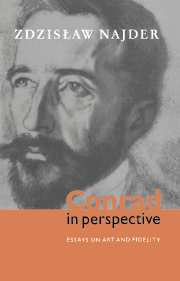Book contents
- Frontmatter
- Contents
- Acknowledgements
- Note on the texts
- List of abbreviations
- 1 Introduction, or confession of a mastodon
- 2 Conrad's Polish background, or from biography to a study of culture
- 3 Joseph Conrad's parents
- 4 Joseph Conrad and Tadeusz Bobrowski
- 5 The Sisters: a grandiose failure
- 6 Lord Jim: a Romantic tragedy of honour
- 7 The Mirror of the Sea
- 8 A Personal Record
- 9 Joseph Conrad's The Secret Agent, or the melodrama of reality
- 10 Conrad, Russia and Dostoevsky
- 11 Conrad and Rousseau: concepts of man and society
- 12 Conrad and the idea of honour
- 13 Joseph Conrad: a European writer
- 14 Joseph Conrad after a century
- 15 Joseph Conrad in his historical perspective
- 16 Fidelity and art: Joseph Conrad's cultural heritage and literary programme
- Notes
- Index
11 - Conrad and Rousseau: concepts of man and society
Published online by Cambridge University Press: 07 December 2009
- Frontmatter
- Contents
- Acknowledgements
- Note on the texts
- List of abbreviations
- 1 Introduction, or confession of a mastodon
- 2 Conrad's Polish background, or from biography to a study of culture
- 3 Joseph Conrad's parents
- 4 Joseph Conrad and Tadeusz Bobrowski
- 5 The Sisters: a grandiose failure
- 6 Lord Jim: a Romantic tragedy of honour
- 7 The Mirror of the Sea
- 8 A Personal Record
- 9 Joseph Conrad's The Secret Agent, or the melodrama of reality
- 10 Conrad, Russia and Dostoevsky
- 11 Conrad and Rousseau: concepts of man and society
- 12 Conrad and the idea of honour
- 13 Joseph Conrad: a European writer
- 14 Joseph Conrad after a century
- 15 Joseph Conrad in his historical perspective
- 16 Fidelity and art: Joseph Conrad's cultural heritage and literary programme
- Notes
- Index
Summary
The objective of this chapter is not a quest for sources. That Conrad read Jean-Jacques Rousseau does not need to be proven; how well he remembered his works and how strongly he felt Rousseau's influence when writing his own novels does not concern me here. What I am attempting is not a genetic enquiry, but an exploration in the history of certain ideas. Nor is this a comprehensive study of the Conrad–Rousseau relation, which would require a fuller discussion of various aspects and diverse components of Rousseau's thought and means of expression.
Rather, comparing Conrad with Rousseau is here supposed to serve three purposes: firstly, to elucidate, by way of a contrastive analysis, Conrad's concepts of man and society; secondly, to place Conrad within the context of the history of European moral and socio-political thought which, in turn, will make it possible to determine his position on the map of philosophical and political tendencies of his day; and, finally, to clarify the intellectual structure of those works of Conrad which can be interpreted in terms of his opposition to Rousseau's ideas.
The political issues raised in Conrad's fiction attracted scant notice during his lifetime. He was also gravely disappointed by the lack of public response to ‘Autocracy and War’, his longest piece of political journalism. But within the last thirty years Conrad as a political writer has been given a growing consideration. Still, the conceptual framework of his thought, the sources and implications of his basic ideas of man, society and historical process, and the relation of his beliefs to the main currents of European political philosophy have not been much explored.
- Type
- Chapter
- Information
- Conrad in PerspectiveEssays on Art and Fidelity, pp. 139 - 152Publisher: Cambridge University PressPrint publication year: 1997
- 1
- Cited by



